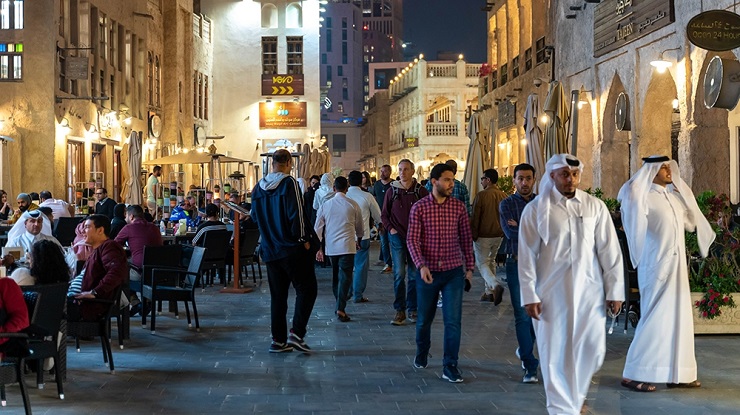The coronavirus pandemic, which has rapidly swept across almost all the countries in the world, has also demonstrated the abilities of individual rulers and the ruling elite to resist this scourge. Quite a few countries, such as the United States, have failed to properly withstand this attack, and have fallen victim to COVID-19; others, such as Qatar, the small but wealthy emirate in the Persian Gulf, have not only coped with the virus but have managed to strengthen their positions, both domestically and internationally.
The strategy adopted by the government in Qatar, based on its official doctrine, rests on three main pillars: providing the general public with medical care, mitigating its economic and social consequences, and fulfilling the country’s international role in helping poorer countries.
On instructions from Tamim bin Hamad Al Thani, the Emir of Qatar, a comprehensive set of measures and procedures was approved that is geared toward overcoming the consequences of this virus-related crisis. A decree was immediately passed to help support and provide financial and economic incentives in the amount of 75 billion riyals (1 riyal = 0.27 USD) to the private sector; this was on top of a directive from the Central Bank of Qatar to defer outstanding loan payments, and the earnings or refunds from those, for whoever wishes that. Decisions made by the Supreme Committee for Crisis Management dictated that for a time period of six months, starting on 16 March 2020, besides the additional liquidity that would be provided to banks, installments for all borrowers would be postponed, public funds would increase investment in the stock market by 10 billion riyals, and there would be exemptions from electricity and water charges.
At the same time, Qatari banks “pumped” 996.2 billion riyals, which representing new loans (lines of credit) into the Qatari economy’s arteries during June alone, with an annualized growth rate of 11.46%, compared to 971.7 billion riyals in the same month the previous year. This trend reflects continuing funding for ongoing projects in the local market, despite the fallout from the coronavirus pandemic, and the tough sanctions that have been unlawfully and unreasonably imposed on the emirate by Saudi Arabia and several of its Arab satellites. At the same time, Qatar has laid down the foundation for new projects worth 2.45 billion riyals (675 million USD). On the other hand, lines of credit extended beyond the bounds of Qatar have reached 1.06 trillion riyals, which represents an increase of 9.88% over last year.
it is well-known that when a normal situation prevails inside a country, the population tries to acquire good housing. So how do things stand in Qatar, which is successfully fighting against both the Covid-19 epidemic and the harsh sanctions imposed by Saudi Arabia? The volume of real estate transactions entered into under sales and purchase agreements registered with the Real Estate Registration and Authentication Department at the Ministry of Justice reached a whopping 784 million riyals for the 12-16 July time period. he weekly bulletin published by the administration indicated that the list of property assets for sale included land plots and residential buildings. Moreover, commercial activities were not only performed in and around Doha, the capital city.
Against the backdrop of unfair, harsh Saudi Arabian sanctions that, in particular, shut down the only land border that the emirate has, great success was still achieved implementing its National Food Security Strategy for 2019-2023. In an interview with the Qatar News Agency, Jaralla al-Marri, the director of the Food Security Department at the Ministry of Municipality and Environment, stressed that the recent period has been marked by an increase in local production, as well as efforts put forth to promote agricultural goods for wide swaths of the population. Yousef Khaled Al-Hulaifi, the director of the Department of Agricultural Research at the Ministry of Municipality and Environment, told the Al-Watan newspaper that over the past two years privately-run agricultural organizations, with help provided by the government, have started to use cutting-edge agricultural machinery such that the quality and quantity of their goods have skyrocketed. At the same time, two promising marketing programs called “Premium Vegetables” and “Qatari Farms” were launched. However, taking into account the fact that Qatar is an extremely wealthy country, it follows a policy of patronage, providing free assistance to many countries around the world. For example, it recently provided an assistance package to Paraguay, which included important healthcare equipment, accessories, and devices to help combat the Covid-19 virus, as well as 500 large food packages and personal hygiene kits.
It is worth noting that the Qatari government has not come to terms with the unjust sanctions imposed by Saudi Arabia and its satellites on the emirate. Qatar’s national airline, Qatar Airways, recently filed claims with international arbitration organizations that seek at least 5 billion USD in damages from neighboring countries following their decision three years ago to shut down their airports and airspace to receive Qatar-registered aircraft, or let them fly through. Qatar Airways has initiated cases in four international arbitration courts against the United Arab Emirates and the kingdoms of Bahrain, Saudi Arabia, and the Arab Republic of Egypt, which have all imposed an illegal air, sea, and land blockade on Qatar since 2017. At the same time, the airline noted that for three decades Qatar Airways has heavily invested in the infrastructure in all these countries to help provide service to hundreds of thousands of passengers, and transport tens of thousands of tons of cargo shipments annually to each. However, since 5 June 2017, Qatar Airways has continued to suffer losses due to the blockade that was declared.
This kind of well-thought-out, professional policy within the emirate, serving the interests of all Qataris, and that defends its interests in the foreign arena, elicits something that, if not admiration, then at the very least represents positive feedback from the leaders in many countries around the world.
Victor Mikhin, member-correspondent of the Russian Academy of Natural Sciences, specially for the online magazine “New Eastern Outlook“.

